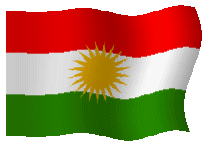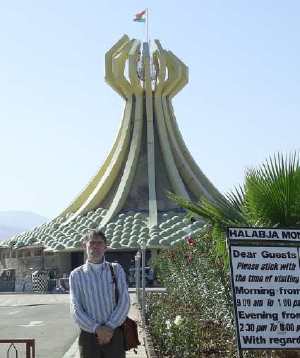

After many years of supporting the struggle of Iraqi kurds, I was in november 2005 given an opportunity to visit the free kurdistan of Iraq, an opportunity I was only too happy to accept. By invitation of the Kurdish National Congress of North America, and with the blessings of the Norwegian Green Party, I took part in a week long journey through the kurdish areas meeting officials of the two main Kurdish parties as well as several smaller ones.
We arrived by air directly from Frankfurt to Irbil airport, which provides Kurdistan with a direct link to the outside world. The airport flew the kurdish flag, Iraqi flags were nowhere to be seen.
Nobody seemed willing to say a bad word about the American invasion, which has led not only to formal self-rule, but also to a Kurdish nationalist, Jalal Talabani, being installed as president of Iraq in Baghdad. Many kurds feel that the clauses on autonomy in the new Iraqi constitution are too weak. What they really want is an independent state.
The two main parties, Jalal Talabani's PUK and Massoud Barzani's KDP, have thrown their weight behind the drive for a federal and democratic Iraq. But this commitment is not unlimited. Massoud Barzani, as president of the combined Kurdish region says, as often as he can, that independence is the only option for Kurdistan if arab Iraq breaks down into civil war. Both in the PUK and in the KDP people think that Turkey, under pressure from the EU, may find it better to have a stable and peaceful Kurdistan on it's borders, than a jihadist-riddled Iraq.
Meanwhile there is an enormous amount of catching up to do in simple infrastructure. Even in the big cities like Irbil and Suleimani, electricity is intermittent, and the water supply insufficient. Subsidised petrol at the official gas stations is in short supply, but a large number of improvised roadside stalls sell petrol at the unofficial price, which is what people have to pay. There is construction work going on literally everywhere, but there is hardly any local industry, and only slowly is international investment appearing.
We went up to the village of Barzani, home of the legendary kurdish leader Mullah Mustafa Barzani. This village was totally destroyed in 1981, and 8 000 men and boys were abducted by the Baathists, never to be seen again. Some of the bodies have recently been recovered from mass graves in the south, and reburied on a hillside overlooking Barzan. The village itself has been rebuilt,but on the hillside the widows weep over nameless graves. The massacres and the destruction are very much recent history.
Barzan is in the region ruled by the KDP, considered the more traditional of the two large parties, The eastern part of the region is controlled by its rival the PUK. The two parties fought a bloody war just 7 years ago. This also has not been forgotten. For now there is power sharing, and talk of uniting the two administrations to create a real multiparty democracy instead of the two one-party statelets now existing.
 Young kurds who have lived all their lives under kurdish selfrule are growing impatient with the large parties, but in the upcoming elections only a small islamist party will challenge the united kurdish list sponsored by the KDP and PUK.
Young kurds who have lived all their lives under kurdish selfrule are growing impatient with the large parties, but in the upcoming elections only a small islamist party will challenge the united kurdish list sponsored by the KDP and PUK.
Green parties have traditionally supported Kurdish rights, but opposition to the US war has made the Iraqi kurds slip off the political agenda. In Suleimani I met Jabar Amin who is both a kurd and an activist in the Swedish Green Party. The Swedish Greens manage to combine resistance to the US-led warfare with support for Kurdish independence. Nobody can accept foreign occupation, says Jabar, and this includes Arab occupation of Kurdish areas as well as western occupation of Arab Iraq. If the Iraqi people want foreign help to deal with the jihadists and baathists, military assistance should be offered by the UN, not by the US, he says.
On our final day in Kurdistan we visited the memorial in Halabja, to the more than 5000 who died when the Baathists bombed the town with poison gas in 1988. At a time when misguided leftists are calling for the reinstatement of Saddam Hussein as ruler of Iraq, this is a deeply moving reminder of his many crimes.
Jan Bojer Vindheim,
Norwegian Green Party